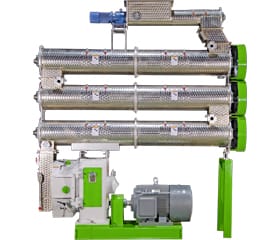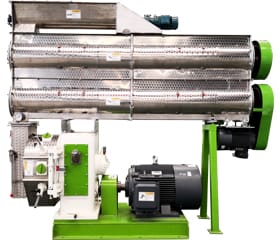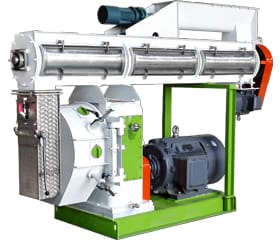Business plan for RICHI bio-organic fertilizer pellet processing plant project with an annual output of 30,000 tons in China

1. Background of RICHI annual output of 30,000 tons organic fertilizer pellet production line in China
In recent years, China's livestock and poultry breeding industry has achieved rapid development for more than 20 consecutive years and has become an important pillar industry in my country's agriculture and rural economy. However, due to the rapid development of large-scale livestock and poultry breeding and regional animal husbandry, the environmental governance of livestock and poultry breeding is relatively lagging, and the discharge of a large amount of breeding waste has brought greater pressure to the surrounding environment. According to statistics from relevant departments, the annual production of aquaculture waste is about 1.73 billion tons, which is 2.7 times that of industrial solid waste, and the COD emissions reached 71.18 million tons, far exceeding the combined COD emissions of industrial wastewater and domestic sewage.
The local government attaches great importance to the vigorous development of animal husbandry. In order to solve the environmental protection problems that currently plague livestock and poultry farms, improve breeding production conditions and ecological environment, through market research, analysis, forecasting and technology of relevant scientific research institutions and consulting units , Engineering, economic analysis and demonstration, proposed this bio-organic fertilizer pellet production plant project, a new bio-organic fertilizer pelletizing plant with an annual output of 30,000 tons, purchase of organic fertilizer fermentation equipment, screening equipment, bio-organic fertilizer pellet making machine and automatic packaging equipment, manure and finished products Transportation vehicles, public auxiliary equipment, etc., realize the unified collection and treatment of livestock and poultry manure in free-range and large-scale farms (households) in Huating County, effectively reducing environmental pollution in the breeding area.
2. Related documents RICHI has provided
(1) "Feasibility Study Report on the New Project of 30,000 Tons Bio-organic Fertilizer Pellet Producing Line in Gansu Province"
(2) "Environmental Impact Report Form of Gansu Province 30,000 Tons of Bio-organic Fertilizer Pellet Production Factory Project"
(3) The power of attorney for the preparation of the project implementation plan.
3. Introduction of customer in this large scale bio-organic fertilizer pellet line project
The customer's bio-organic fertilizer pellet making plant was established on May 21, 2013 with a registered capital of 4 million yuan. It is an independent legal entity enterprise integrating the development, processing and sales of bio-organic fertilizers. The company is located in Wangxiakou Village, Donghua Town, Huating County, and currently has 35 employees, including 2 managers.

4. Introduction of annual output of 30,000 tons organic fertilizer pellet production plant
(1) Project location: Gansu Province, China
(2) Construction scale: 30,000 tons per year new bio-organic fertilizer pellet manufacturing plant
(3) Construction content:
Newly built organic fertilizer fermentation workshop 449.14m2, organic fertilizer production workshop 942.24m2, organic fertilizer finished product warehouse 987m3, warehouse 81.25m2, manure stacking plant 525m2, integrated office 172.8m2, power distribution room, maintenance room and public works, supporting organic Fertilizer fermentation equipment, screening treatment equipment, granulation and packaging equipment, excrement and finished product transportation vehicles, public auxiliary equipment, etc.
(4) Main animal manure bio-organic fertilizer pellet line production process
According to the characteristics of livestock and poultry manure, combined with the current domestic existing mature treatment technology of livestock and poultry manure, the process of fermentation with bacteria added is adopted.
The specific process is as follows:
Mix livestock and poultry manure with a water content of less than 70% with auxiliary materials and special-function microbial fermentation agents, and then pass continuous tank fermentation (one machine with three tanks) to fully ferment and decompose livestock manure. After the fermentation, the organic waste with a water content of about 30% to 35% is screened, magnetically separated, and then pelletized to prepare round-particle organic fertilizer. Add functional bacteria to produce bio-organic fertilizer.
(5) RICHI new technology 30,000 tons/year organic fertilizer pellet production factory project investment cost
The bio-organic fertilizer processing project requires a total investment of RMB 8.8693 million. Among them: the application for special support funds for environmental protection of RMB 2,238,18, accounted for 25.19% of the total investment of the project, the enterprise self-raised RMB 6,648,750, accounting for 74.81% of the project investment. The total investment of the project is 8.8693 million yuan, of which: construction engineering investment is 4,341,550,000 yuan, accounting for 48.85% of the total investment; equipment investment is 2,238,18 million yuan, accounting for 25.19% of the total investment; other engineering construction costs are 2,307,200 yuan, accounting for 25.96% of the total investment .

5. Project implementation plan
(1) Geographical location and organic fertilizer pellet plant factory site location
The project construction site is located in Donghua Town, Huating County, 1km away from the nearest village.
(2) Site area and current status of the factory
The site covers an area of 14.44 acres (133.4m in the west, 55m in the south, 138.1m in the east, and 90m in the north). It is leased land and is now a wasteland. There are other buildings in the site and the construction conditions are good.
(3) Water supply conditions
The water supply is supplied by a newly drilled 5m deep pumped well in the plant area and a supporting automatic water supply system, and a new reservoir of 150m3 in the plant area is supplied to the whole site through the water supply pipe network.
(4) Power supply conditions
The power used in the plant is supplied by a 10kv high-voltage line around the site, which has been led to the plant by overhead. The project area is equipped with a 200kvA transformer and supporting facilities to meet the power demand for the project.
(5) Heating conditions
The heat used in the plant area is mainly fertilizer drying, which is supplied by hot air stoves; in winter, office heating uses coal stoves, which can meet the needs of the project.
6. Process technology plan of heavy duty organic fertilizer pellet processing plant with an annual output of 30,000 tons
With the rapid development of animal husbandry, the problem of manure treatment and utilization in livestock and poultry farms is particularly prominent. The amount of livestock and poultry manure has increased sharply. The high water content and foul smell of livestock and poultry manure, coupled with the large volatilization of NH3-N during treatment, and the pathogenic microorganisms and weed seeds contained in livestock and poultry manure pose a serious threat to the environment. Therefore, reduction, harmlessness, resource utilization and comprehensive utilization of livestock and poultry manure have become the basic direction of livestock manure treatment. From the perspective of environmental protection and resource reuse, the treatment of livestock and poultry manure mainly includes two meanings: one is to treat livestock and poultry manure through simple and effective methods. Make it a useful resource for reuse (such as as feed or organic fertilizer, etc.);The second is to achieve the purpose of deodorization during this treatment. With the advancement of contemporary technology, the treatment of livestock and poultry manure is expanding from the long-inherited method of applying it as farm manure to the processing and conversion into fuel, commercial fertilizer, and feed products. The current treatment technologies for livestock manure mainly include dry treatment technology (physical treatment method), deodorization technology (physical deodorization, chemical deodorization, biological deodorization) and comprehensive treatment technology (biological fermentation treatment method).

★Technical process
(1) Pretreatment process
In the livestock and poultry manure transported into the factory, a special zeolite biological deodorant is connected. The specific method and dosage is to take 2kg/t of special zeolite biological deodorant and 1kg/t of liquid strain according to the quantity of livestock and poultry manure, adopt the method of feeding and inoculating bacteria, and use artificial or auxiliary equipment to remove solid and liquid. The odorant is evenly spread on the surface of livestock and poultry manure, and then it is transferred to the next cleaning procedure.
Use a loader to turn over the deodorized livestock and poultry manure, with manual turning method to remove all debris such as iron wire, bricks, cement blocks, plastic, wood, glass, rags, etc. After the miscellaneous work is completed, it also plays a role in the mixing of bacteria.
(2) Fermentation
Use a forklift to send the cleaned livestock and poultry manure into the fermentation tank, and at the same time crush a certain proportion of auxiliary materials and add them to the fermentation tank to mix and ferment with the livestock and poultry manure. The daily ingredients are 1/8 of the tank length. The accumulation thickness of the fermentation materials in the tank is 80-100cm, and continuous aerobic fermentation is carried out by natural ventilation and oxygen provided by the contact between the materials and the air. The fermentation period is 7-8 days. Under the transportation of the vertical and horizontal traveling mechanism of the turning and throwing machine, the high-speed rotating round rake continuously throws, scatters and produces a certain displacement of the fermentation materials, so that the materials are moved backward in a regular and equidistant manner in the tank. At the end of the tank, the fermented materials are transported away, and the space vacated at the front of the fermentation tank is supplemented with new fermentation materials, thus forming a continuous fermentation process. The fermentation turning process can be fully automated and intelligently controlled, and the moisture content of the organic raw materials after fermentation is generally 20% to 35%.

(3) Granulation
①Broken
After fermenting and storing for days, it is crushed, and the fermented organic material is dried, crushed and sieved.
②Composition and mixing
In the production process of a series of special fertilizers, according to different soil conditions and different crops, inorganic nutrients and concentrated organic matter and trace element minerals are added to make the fertilizer contain a variety of nutrients required for plant growth such as nitrogen and phosphorus , Potassium, sodium, manganese, etc., according to the formula, the nitrogen, phosphorus, potassium and the fermented materials are mixed by computer, and the conveyer is sent to the organic fertilizer pellet granulator machine for granulation.
③Granulation
Because of the production of biological fertilizers, organic matter is the mainstay, the cellulose is high, the molding conditions are poor, and the living bacteria that can make fertilizer are added, the production process is not suitable for high temperature. Disc granulation and drum granulation methods are not suitable for the material preparation method, because these two processes require high pulverization of raw materials, and generally have a water content of about 30%. For this reason, the drying load is large and the effective bacteria The loss is also large, and the ball formation rate is low (about 60% to 70%). During the production process, the dust is very large and the operating environment is very poor, so it is not conducive to the production of organic bio-fertilizer. It should be produced by environmental extrusion method. Environmental extrusion has low requirements for raw material crushing and high forming rate (above 95%). After molding, the particles have low water content, and the drying conformity is very small, which can reduce the effective bacteria flying and lose dust, and the operating environment is better.
The raw materials enter the organic fertilizer pellet mill, and pass in an appropriate amount of steam to bond them into organic fertilizer granules. After pelleting section, the materials are sent to the fertilizer dryer equipment through a belt conveyor for drying. The particle diameter is 3.0-4.0mm, and the granulation rate is greater than 70%.
(4) Drying
In the production process of biological fertilizers, not only the water content of the granules after molding generally exceeds the target, and low-temperature drying is required, but also the water content of the organic raw materials after fermentation is about 30% to 40%, and the water content of the granules after granulation is generally 15 Between %~20%, drying is required. Therefore, the drying section is an indispensable and important process in the production of biological fertilizers. It directly affects the output, quality and energy consumption. It is very important to choose the model and specifications of the organic fertilizer dryer reasonably and to control the process conditions.
(5) Cooling
The dried material is sent to the pellet cooler by a belt conveyor for cooling. The cooling process is mainly to use a fan to send natural air into the cooler through a pipe to cool the material. The air direction inside the cooler is countercurrent, passing through the fan and the pipe. The exhaust gas drawn into the settling chamber is treated the same as the drying exhaust gas and then discharged into the atmosphere.
The cooled materials are screened, and the large-particle materials are crushed together with the sieved powder into the return belt and conveyed to the granulator for re-granulation, and the finished products are packed in the automatic packaging system.
★Parameters of equipments needed in professional turn-key organic fertilizer pelleting plant with an annual output of 30,000 tons
The project is designed with an annual production day of 250 days and two shifts per day. Each shift processes 60 tons of organic fertilizer and 30,000 tons of organic fertilizer annually. The main technical indicators of organic fertilizer are as follows:
•Conditions for fecal fermentation
| Number | name | Allowable range | Remarks |
| 1 | Organic matter | 50%~70% | best at 65% |
| 2 | C/N | 30:1~35:1 | After being decomposed, 15:1~20:1 |
| 3 | PH | 6~8 | best 6.5~7 |
| 4 | Fermentation time | 7d~8d | |
| 5 | Fermentation temperature | 50~60℃ |
•Conditions for fecal fermentation
| Number | name | Standard |
| 1 | Organic matter content (%) | Qualified product≥35,First-class product≥45,Superior product≥55 |
| 2 | Total nutrient content (%) | ≥5.0 |
| 3 | Moisture content (%) | ≤20 |
| 4 | PH | 5.5~8.0 |
| 5 | Particle size :powder (less than 0.5mm),pellet(2.5-6.0mm) | powder≥90%,pellet≥70% |
7. Source of raw materials
The main raw materials produced by the project are manure of livestock and poultry such as dairy cows, beef cattle, chickens, sheep, etc. The manure mainly comes from scattered households and some large-scale farms around the enterprise.
| Number | Manure Type | Source | Farming scale (head) | Manure production (t/a) |
| 1 | Beef manure | Xihua Farmers | 2100 | 15330 |
| 2 | Beef manure | Horse Gorge Farmers | 2000 | 14600 |
| 3 | Beef manure | Ankou farmers | 2300 | 16790 |
| 4 | Beef manure | Donghua Farmers | 2100 | 15330 |
| 5 | Beef manure | Hongyuan Company | 2000 | 14600 |
| 6 | Cow manure | Donghua Farm | 1200 | 8760 |
| 7 | Sheep dung | Donghua Farmers | 1200 | 1140 |
| 8 | Sheep dung | Xihua Farmers | 2000 | 1900 |
| 9 | Chicken manure | Donghua Farm | 85000 | 4657 |
| Total | 93107 |
8. Material consumption quota
The project uses manure such as cow manure, sheep manure and chicken manure to process organic fertilizer, and consumes quota for manure, electricity, and water.
| Number | Name | Daily consumption | Annual consumption |
| 1 | manure | 360t/d | 90000t/a |
| 2 | Straw and other attached fillers | 8.5t/d | 2125t/a |
| 3 | leavening agent | 0.33t/d | 82.5t/a |
| 4 | Packaging and others | 3500 | 87.5(Ten thousand/a) |
| 5 | water | 0.02 tons/ton·year | 600 |
| 6 | Electricity | 11.0 degrees/ton·year | 330000 |
| 7 | fuel | 0.015 tons/ton·year | 450 |
9. Organic fertilizer processing equipments selection
This project is equipped with organic fertilizer fermentation equipment, screening treatment equipment, organic fertilizer pelletizer machine and packaging equipment, excrement and finished product transportation vehicles, and public auxiliary equipment.
| Number | Machine Name | Quantity | Model |
| 1 | Organic fertilizer grinder machine | 1 | LP60 11kw |
| 2 | Conveyor | 8 | DT500 2.2kw |
| 3 | Mixer machine | 2 | |
| 4 | Organic fertilizer pelletizing equipment | 1 | ZD30-49kw |
| 5 | Rotary dryer | 1 | Φ1.5×12m |
| 6 | fan | 1 | Φ1.2×8×2.5m |
| 7 | Finished product warehouse |
1 | 4-72N08C 22kw |
| 8 | Fermentation turning machine | 1 | |
| 9 | Light rail | 1 | GS12X25 5.5kw |
| 10 | Four warehouse batching machine | 1 | |
| 11 | Lifting belt conveyor | 1 | 15# |
| 12 | Laboratory equipment | 1 | |
| 13 | Finished product transporter |
2 | |
| 14 | Forklift | 2 | |
| 15 | Manure collection truck | 2 | |
| 16 | Raw material loader | 1 | |
| 17 | Forklift | 1 |
10. Construction plan
The construction of this project is mainly composed of organic fertilizer fermentation workshop, screening and granulation workshop finished product warehouse, comprehensive office, staff canteen and quality inspection laboratory.
| Number | Building name | Structure type | Area(㎡) |
| 1 | Organic fertilizer production workshop | Bent structure | 942 |
| 2 | Organic fertilizer fermentation workshop | Bent structure | 450 |
| 3 | Excrement dump | Bent structure | 525 |
| 4 | Finished product library | Portal steel frame | 987 |
| 5 | Raw material stacking workshop | Masonry structure | 840 |
| 6 | warehouse | Portal steel frame | 81 |
| 7 | Canteen |
Masonry structure | 63 |
| 8 | General Office | Masonry structure | 172 |
11. Project emission reductions
This best design animal poultry livestock manure pellet production line for organic fertilizer pellets is based on the characteristics of livestock and poultry manure, combined with the current mature treatment technology of livestock and poultry manure, and uses the process of adding bacteria to produce organic fertilizer. Through the organic fertilizer processing of livestock and poultry manure, the harmless and resource utilization of livestock manure can be completely realized. According to national standards, the pollution production coefficients of COD and NH3-N of beef cattle are 712kg/head·year and 2.52kg/head·year respectively, and the pollution production coefficients of COD and NH3-N of dairy cows are 1065kg/head·year and 2.52 respectively. kg/head·year. It is estimated that the annual COD emission reduction can be 9585.630 tons and NH3-N 32.285 tons.
12. Benefit analysis
(1) Environmental benefits
This project will carry out organic fertilizer processing after uniform collection of farming manure to solve the environmental pollution problem caused by rural farming, especially free-range farming, turning waste into treasure, improving rural production and living conditions, and reducing environmental pollution caused by livestock and poultry farming , Creating an environment for the establishment of animal husbandry development with high-efficiency large-scale breeding of livestock and poultry, safe production of livestock products processing, and a virtuous cycle of ecological environment. The implementation of this project will enable the utilization of 93,000 tons of livestock and poultry manure resources and reduce COD 9,585.63t/ a, NH3-N 32.285t/a, effectively reducing environmental pollution in the breeding area.
(2) Economic benefits
According to the various indicators of the financial evaluation of the feasibility study report, the project investment profit rate is 20.9%, the investment profit and tax rate is 26.132%, and the financial internal rate of return after income tax is 21.11%, which is higher than the benchmark rate of return of 8%. The present value is greater than zero. From the financial evaluation results, the project has strong financial anti-risk ability and profitability, and the overall project investment can achieve better financial benefits.
(3)Social benefits
The project is based on local resources and industrial comparative advantages. Through the project, the fecal pollutants of farmers in the project area and surrounding areas have been effectively treated, so as to achieve effective use of resources and bring the aquaculture industry into the track of a virtuous cycle and ecological balance. , Which will help the agricultural production in the project area move towards a circular agricultural development model integrating planting, breeding, and processing, and realize the coordinated development of economy, society and resources. At the same time, it will promote the development of aquaculture and planting in the project area and optimize the development of the project area. Agricultural industry structure.
In addition, in normal years, sales tax and additional 1.7787 million yuan and income tax 1.5497 million yuan can be realized, which will help increase local fiscal revenue and promote economic development.
If you want to built one complete pellet production line in your country, pls send the inquiry to us. We will customized design according to your requirement.



